
|

Note, this article is part of a topical study series. My hope in writing this page was to explain the passages concerning divorce as clearly as possible, without including my viewpoint on the issue. This principle was demonstrated by the prophet Jeremiah, who used the phrase "Thus saith the Lord" 147 times in the book Jeremiah. May the Grace of our Lord Jesus Christ be with your spirit. They two shall be one fleshThe first statement Jesus made in response to the Pharisees question in Matthew 19 was:
Have ye not read, that he which made them at the beginning
made them male and female,
And said, For this cause shall a man leave father and mother,
and shall cleave to his wife:
and they twain shall be one flesh?
Wherefore they are no more twain (two),
but one flesh.
What therefore God hath joined together,
let not man put asunder.
Matthew 19:4-6 In the sketches below, the circle represents the one flesh
union God has joined together. Matthew 5:32Jesus teaching to the multitudes at the Mount of Olives:
But I say unto you, That whosoever shall put away his wife,
saving for the cause of fornication,
causeth her to commit adultery:
and whosoever shall marry her that is divorced
committeth adultery.
Matthew 5:32 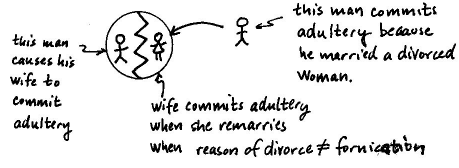 It is very interesting in both this verse and in Matthew 19:9, Jesus says that whosoever puts away his wife, except it be for "pornea", commits "moichao". Many people have tried to justify a spouse committing adultery on them as grounds for divorcing them. But Jesus is very clear about the exception being based on "pornea" not on "moichao". This is further illuminated in the article title the divorce exception, where we look back at the actual law that Moses gave concerning divorce. Fornication is defined as "illicit sexual intercourse", whereas adultery is defined "to have unlawful intercourse with another's wife" [1]. Adultery differs from fornication in that it involves a person that God has joined together with another in a one-flesh union. The following verse clearly dileanates "fornicators" and "adulterers" as two different types of people:
Know ye not that the unrighteous shall not inherit the kingdom of God?
Be not deceived: neither fornicators , nor idolaters, nor adulterers, nor effeminate, nor abusers of themselves with mankind, Nor thieves, nor covetous, nor drunkards, nor revilers, nor extortioners, shall inherit the kingdom of God. 1 Corinthians 6.9-10 Matthew 19:9Jesus answering the Pharisees who were living under the Mosaic law:
And I say unto you, Whosoever shall put away his wife,
except it be for fornication
, and shall marry another,
committeth adultery:
and whoso marrieth her which is put
away doth commit adultery.
Matthew 19:9 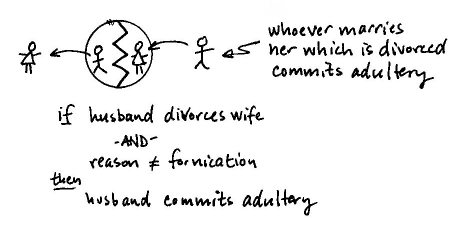 This situation refers back to the law that Moses gave in Deuteronomy 24:1-2:
When a man hath taken a wife, and married her, and it come
to pass that she find no favour in his eyes,
because he hath found some uncleanness in her:
then let him write her a bill
of divorcement, and give it in her hand, and send her out of
his house. And when she is departed out of his house, she
may go and be another man's wife.
Deuteronomy 24:1-2 Mark 10:11-12Jesus teaching to the Pharisees who were living under the Law:
And he saith unto them,
Whosoever shall put away his wife, and marry another,
committeth adultery against her.
And if a woman shall put
away her husband, and be married to another,
she committeth adultery.
Mark 10:11-12 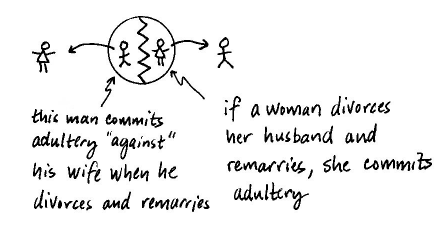 Luke 16:18Jesus teaching to the Pharisees who were living under the Law:
Whosoever putteth away his wife, and marrieth another,
committeth adultery: and whosoever marrieth her that is put away from her husband committeth adultery. Luke 16:18 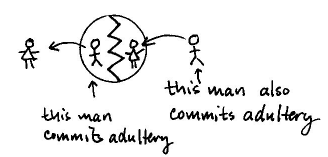 Romans 7:2-3Paul's teaching to "all who are in Rome, beloved of God, called to be saints" (Romans 1:7):
For the woman which hath an husband
is bound by the law to her husband so long as he liveth; but if the husband be dead, she is loosed from the law of her husband.
So then if,
while her husband liveth,
she be married to another man, she shall be called an adulteress:
but if her husband be dead, she is free from that law; so that she is no
adulteress, though she be married to another man.
Romans 7:2-3 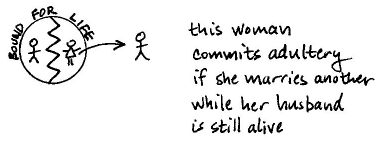 1 Corinthians 7:10-11Paul's teaching to the "church of God which is at Corinth, to those who are sanctified in Christ Jesus, called to be saints, with all who in every place call on the name of Jesus Christ our Lord" (1Corinthians 1:2):
And unto the married I command, yet not I, but the Lord, Let
not the wife depart from her husband: But and if she depart,
let her remain unmarried,
or be reconciled to her husband:
and let not the husband put away his wife.
1 Corinthians 7:10-11 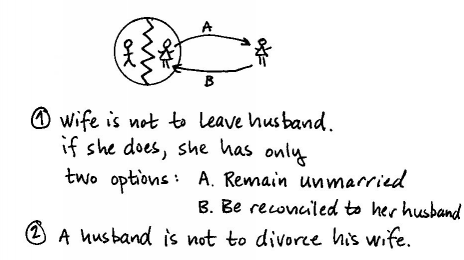 1 Corinthians 7:15
But if the unbelieving depart, let him depart. A brother or
a sister is not under bondage
in such cases: but God hath called us to peace.
1 Corinthians 7:15 What does bondage mean?It comes from the Greek word douloo (1401) which is translated [1]:
This does not mean s/he is free to remarry (as Erasmus has translated it, and caused the majority of the church to follow). We take this bondage to mean, that s/he is relieved from the responsibilities or duties of being a spouse. This is confirmed by noticing later in the same passage, Paul says:
The wife is bound by
the law as long as her husband liveth;
but if her husband be dead, she is at liberty to be married to whom she will; only in the Lord. 1 Corinthians 7:39 Here again, Paul reiterates the fact that a wife is bound to her husband as long as he lives. Paul's Judgment on the Matter
I say therefore to the unmarried and widows,
It is good for them if they abide even as I. But if they cannot contain, let them marry: for it is better to marry than to burn. 1 Corinthians 7:8-9
I suppose therefore that this is good for the present distress,
I say, that it is good for a man so to be. Art thou bound unto a wife? seek not to be loosed. Art thou loosed from a wife? seek not a wife. But and if thou marry, thou hast not sinned; and if a virgin marry, she hath not sinned. Nevertheless such shall have trouble in the flesh: but I spare you. 1 Corinthians 7:26-28 But I would have you without carefulness. He that is unmarried careth for the things that belong to the Lord, how he may please the Lord: But he that is married careth for the things that are of the world, how he may please his wife. There is difference also between a wife and a virgin. The unmarried woman careth for the things of the Lord, that she may be holy both in body and in spirit: but she that is married careth for the things of the world, how she may please her husband. And this I speak for your own profit; not that I may cast a snare upon you, but for that which is comely, and that ye may attend upon the Lord without distraction. To the divorced woman (who left her husband)
"let her remain unmarried,
or be reconciled to her husband:"
1 Corinthians 7:11 There does not appear to be any clearly explicit statements on what a wife should do that was put away because of marital unfaithfulness, but it clear that she is bound to her husband for as long as she lives (Romans 7:2, 1 Corinthians 7:39). ConclusionThe goal in this article is to present the plain sense of the Scriptures on divorce. We encourage the reader to search the Scripture for themselves (Acts 17:11), and to have faith to yourselves before God (Romans 14:22).
"Let us hear the conclusion of the whole matter:
Fear God, and keep his commandments: for this is the whole duty of man. For God shall bring every work into judgment, with every secret thing, whether it be good, or whether it be evil." Ecclesiastes 12:13-14 Related Articles
References1. BlueletterBible.org
|
